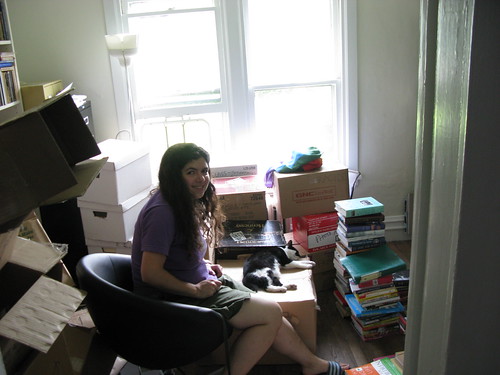This blog post is brought to you by the letter ‘S’!
As I mentioned last week, we are soon moving house. A week today, in fact. Seven days. In six days, the movers will be coming to pack everything up. Everything, that is, except the books, which we plan on packing ourselves.
So far I have managed to pack up the mystery collection (it has its own book case) which filled three wine boxes: Agatha Christie, Assorted Mystery, and Assorted Mystery: Paperback. Although to be honest with you, I think there’s some Christie in every box. An excellent vintage.
They’re all packed and taped and labelled and this is all very satisfying to behold, until the sinking realization that there will be no more mystery-reading until we unpack at the new house.
No Miss Silver, no Poirot, no Miss Marple, no Tommy and Tuppence, no Cadfael, no Inspector Wexford. No Mma Ramotswe.
I am desolate.
You see, reading mysteries is one of my favourite ways of dealing with stress. (The wine boxes were empty when I got them.) I can comfortably read one in the morning, one in the afternoon, and (if circumstances are really dire) one in the evening as well, though headaches may threaten.
In a mystery, as in life, there are things that go wrong, unfair actions and suspicions, confusion and uncertainty. Perhaps this is why I so much enjoy the old-fashioned detectives who give a full explanation in the last chapter: there are answers.
There will be answers.
But not today.
Has anyone else noticed that moving house is like a magnet in a field of iron filings, a lead weight on a rubber sheet covered in sand (or, again, iron filings)? It attracts other stressors.
I went and had a look at the Holmes & Rahe stress scale, and I figured my score was around 271. “Risk of illness is moderate.”
What was I thinking, packing the mysteries a week out?
Of course, as the logically-minded (or anarchically-minded) among you will point out, if I get desperate I can always open one of the boxes. But this violates the cardinal law of successful moving:
That Which Has Been Packed Shall Not Be Unpacked.
Or at least not until you arrive at the other house. Then it’s a toss-up whether you go first for the bedding, the kettle, or the books. Or the cat.
But I have still a secret weapon up my sleeve – or rather, in a tea tin. Just for a change, it’s not tea, delectably de-stressing as that excellent beverage is. It’s knitting.
When I am stressed, I knit. Last year, I knit my father a cardigan (it was quite a stressful year). Usually I go for smaller projects – hats, baby items (for charity – stressed enough without one of my own, thank you) and most recently, socks.
It took an embarrassingly long time for me to figure out how to turn a heel, but I am now working on my second pair of real, wearable socks (in recycled merino/possum blend – soft and fuzzy).
Although socks are less escapist, knitting has the advantage over novels in one respect: time. There is nothing more frustrating than just getting into a story when your ten minutes for tea expires and it’s back to work (all right, there is, but let’s not go there, I’m stressed enough already).
Mind you, I managed to read the unabridged Nicholas Nickleby entirely in breaks at work, so it’s not entirely unworkable. But mysteries should not be chopped into little pieces in such a way.
I would be delighted to hear your tips for handling stress (moving-related or otherwise); and do feel free to administer your own Holmes-Rahe test and leave your results in the comments.
(Highest score gets bragging rights and an ulcer; lowest score gets a smug sense of superiority and an unimpaired duodenum.)
And tell me: what would you unpack first?









